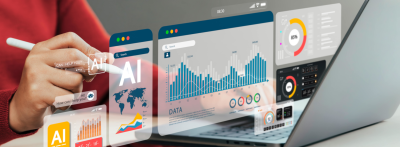Regardless of the industry, data-driven decision-making is essential for implementing strategic plans and achieving long-term success. In turn, the business intelligence (BI) field is expanding rapidly, with professionals working to leverage BI tools to collect data and generate actionable insights.
Meanwhile, artificial intelligence is revolutionizing the field of business intelligence. Advanced artificial intelligence (AI) tools and methodologies are allowing BI experts to streamline their processes, improve the accuracy of analytical predictions, and increase their productivity overall.
What Is Business Intelligence?
Business intelligence is a specialized field that focuses on collecting business data to gain insights that support strategic planning efforts and informed decision-making. According to CIO, the term business intelligence also refers to the advanced tools that BI specialists utilize to collect and analyze data as well as generate digestible information for business leaders to use when developing and implementing business strategy.
How AI Integrates With Business Intelligence
Artificial intelligence, commonly referred to as AI technology, integrates seamlessly with business intelligence. In many ways, AI and business intelligence are now inextricable from each other.
AI offers a solution to various challenges BI professionals have faced in recent years. When applied to leading BI tools, AI technology can automate processes that were once done manually and enhance the precision of data reporting. By implementing AI technology and integrating it into the workflow, BI specialists can reduce the time spent on manual tasks and focus more on generating the insights required for intuitive, data-driven decision-making.
Key Benefits of AI-Enhanced Business Intelligence
Integrating AI tools and methodologies into your business intelligence processes can prove advantageous. Since the AI revolution began, business leaders and data scientists have found that AI-enhanced BI tools lead to:
- Faster Decision-Making – By automating tasks and streamlining workflows, BI tools enhanced with AI technology enable faster decision-making in business settings. Leaders are empowered to act swiftly and confidently, knowing they have the most accurate insights available.
- Improved Accuracy – AI technology supports the accuracy of data-driven business insights. When manual tasks are automated with AI technology, the risk of human error is significantly reduced.
- Personalized Insights – Generative AI tools can help create personalized insights based on actionable data that allow business leaders to identify the best possible decision for their specific organization.
- Natural Language Interaction – AI technology can be applied to unstructured data through natural language processing and interaction; this allows business intelligence experts to quickly glean insights from traditional documents (like newspaper articles or legal reports).
- Predictive and Prescriptive Capabilities – AI-enabled tools possess both predictive and prescriptive capabilities, enabling business intelligence specialists to better understand what may happen in the future, as well as what is needed to achieve both short-term and long-term organizational goals.
How AI Is Applied in Business Intelligence
AI-powered tools can be applied to numerous business intelligence processes, allowing BI specialists to reduce the amount of time spent on manual tasks and focus primarily on transforming data into personalized, actionable insights that business leaders can rely on.
Below are some of the most powerful applications of AI technology in the business intelligence realm:
Data Preparation and Cleansing
Business intelligence experts frequently work with raw data to uncover patterns and glean actionable insights that business leaders refer to when creating strategic plans. Before that raw data can be analyzed, it must be adequately prepared and cleansed. AI-powered tools can automate the complex process of data preparation and cleansing, streamlining workflow, and enabling easy access to accurate raw data that can be used for visualization and reporting.
Pattern Recognition and Anomaly Detection
AI algorithms have the ability to identify patterns and anomalies that humans may not recognize instantly. By automating the process of collecting and analyzing data through AI-enhanced technology, business intelligence professionals can pinpoint patterns that may transform the organization’s processes, ultimately leading to improved customer service and satisfaction.
Forecasting and Predictive Analytics
Business leaders of all types rely on data prediction models and forecasting to develop and implement strategic plans that support their organizational goals. AI-enhanced technology can help them build forecasting and predictive analytics models that automate the process of analyzing historical data to generate predictions of what may happen in the future. Improving the precision and accuracy of forecasting allows BI specialists to have a direct impact on the success of organizational strategy.
Natural Language Queries (NLQs) and Reports
In many ways, natural language queries help humanize the process of data analysis. NLQs provide a mechanism for interacting with data analysis reports in natural language, enabling direct communication with the data. Essentially, NLQs work to generate reports that guide business intelligence experts and organizational leaders as they navigate the results of their data analysis.
Use Cases Across Industries
AI-enhanced BI tools can be applied across numerous industries, enabling organizational leaders to increase efficiency, improve workflows, and boost the customer experience. According to IBM, the following are examples of industries that benefit from AI-powered business intelligence processes:
- Retail – In the retail sector, AI tools can harvest and analyze user data to deliver a personalized online shopping experience to the target audience.
- Healthcare – AI technology is applied throughout the healthcare sector to automate processes, improve precision, and allow for personalized telehealth services.
- Finance – Predictive analytics is used frequently in this sector to help financial experts as well as their clients understand how to manage their wealth and assets best.
- Manufacturing – Generative AI can help improve product design to accommodate market trends better and elevate efficiency during the manufacturing process.
- Education – Educators at all levels are working to provide personalized learning experiences, and AI technology is paving the way forward. AI-enabled educational tools can help create tailored materials based on the unique needs of each student.
Challenges and Considerations
While AI technology is quickly transforming the business intelligence landscape, there still exist challenges to be aware of:
- Data Privacy and Security – The risk of cyberattacks seems to climb every day. Business intelligence professionals actively strive to ensure that the AI tools they use protect data privacy and enhance security overall.
- Data Quality – In order to deliver precise and accurate results, AI-enabled tools must have access to high-quality data. Business intelligence experts may need to refine or improve their data collection processes before integrating advanced AI tools into their workflows.
- Cost and Implementation – The most advanced AI tools are costly, calling for close collaboration with leadership to ensure you invest in the most valuable and relevant AI-enabled tools.
- Change Management – As leadership evolves, business intelligence specialists need to ensure that implementing AI technology remains a priority despite shifts in the organizational landscape.
The Future of Business Intelligence With AI
The era of artificial intelligence has arrived, and for the foreseeable future, this technology is here to stay. Most business intelligence experts agree that AI technology will continue to become more intuitive and powerful, allowing BI tools to be leveraged more readily across all fields and industries.
Is Your Business Ready for AI-Powered BI?
Now is the best time to begin preparing for the AI revolution. By improving data-entry processes, investing in the leading BI tools, and elevating data security, you can start harnessing the power of AI-enabled BI tools.
Discover the Connections Between AI and Business Intelligence at Champlain College Online
Artificial intelligence will be the foundation of the future, requiring those interested in business analytics and data science to begin developing their expertise in this advanced technology. The data science and artificial intelligence bachelor's degree offered at Champlain College Online integrates computer science, mathematics, and AI methodologies to equip students with the skills needed to innovate in this dynamic field. With an emphasis on cutting-edge technology and applied learning, this program prepares graduates to leverage the power of AI throughout their careers.
Request more information about our online degree programs today.
Request Information
Connect with our admissions team to learn more about Champlain College Online today.

Request Information
I acknowledge that, by clicking the "submit" button, I am giving my express written consent to Champlain College and its representatives to contact me about educational opportunities via email, text, or phone, at the phone number above, including my mobile phone, using an automatic dialer, or pre-recorded message. Message and data rates may apply. I understand that my consent is not a requirement for enrollment, and I may withdraw my consent at any time.






